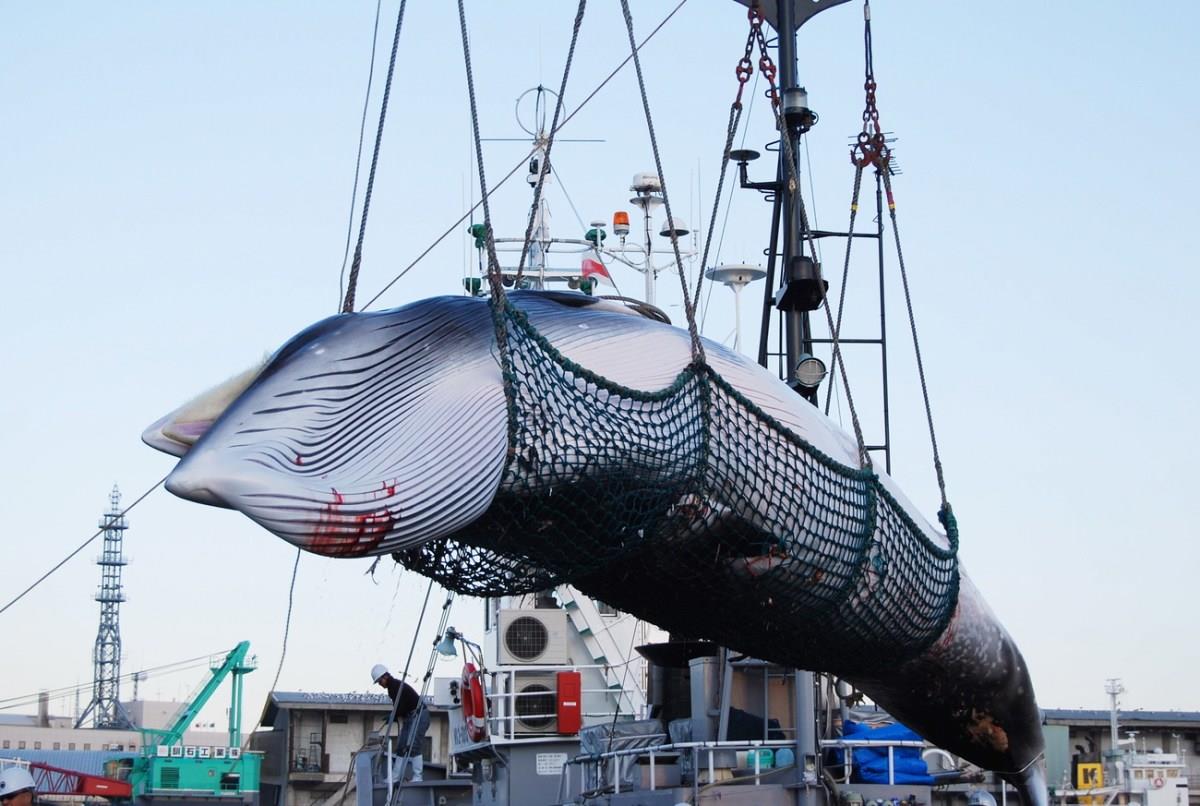
Is Japanese Commercial Whaling Compatible With International Law?
Warfare, humanitarian crises, climate change, health... Rachel covers geopolitical issues from international Geneva. As a former environmental journalist, she has developed a keen interest in raw materials and has reported on mining conflicts in the Arctic. She also coordinates the 'Genève Vision' editorial project, a joint venture between SWI Swissinfo, Géopolitis RTS and the European Broadcasting Union (EBU).
-
More from this auth
French Departme
International efforts to regulate whaling began almost 100 years ago in Geneva, with a 1931 convention at the League of Nations. Almost a century later, the issue is still heated: on August 6 some 40 demonstrators turned up in front of the United Nations building in the Swiss city, brandishing banners and shouting“Free Paul Watson” – in reference to the Canadian-American ecological activist currently in custody in Greenland while Danish authorities examine an extradition request by Japan.
+ Sign up to one of our weekly newsletters
Watson, the 73-year-old figurehead of the Sea Shepherd group and a co-founder of Greenpeace, was arrested in Nuuk on July 21 after docking to refuel; he was on his way to chase down a Japanese whaler in the North Pacific. An international arrest warrant issued by Tokyo in 2012 accuses Watson of having damaged a Japanese whaler in 2010 and injured a crew member by throwing a stink bomb. Watson, who faces a prison sentence of around 15 years in Japan, rejects the charges.
His arrest has sparked an international outcry: petitions have been launched, and even French President Emmanuel Macron weighed in with support for Watson. But what about international law – what does it say about the legality of commercial whaling?
External Content Controversial and bannedCommercial whaling has been illegal since 1986, when an international ban decreed by the International Whaling Commission (IWC) came into force. Norway and Iceland subsequently objected to the ban and continued to hunt whales; Japan got around the ban for years by claiming its ships were engaged in“scientific research”.
But in 2014 the International Court of Justice (ICJ) condemned Japan for its whaling in the Antarctic.“The court judged that Japan was disguising commercial practices under a scientific pretext, since the criteria for scientific research were not met,” says Laurence Boisson de Chazournes, a professor of international law at the University of Geneva, who was involved in the case as an advisor and lawyer.
Japan initially stopped its Antarctic expeditions as a result of the ruling. In 2019, however, it decided to leave the IWC and re-start commercial whaling within its own territorial waters and exclusive economic zone.“This was a drastic and surprising decision, which strangely went rather unnoticed by the international community,” says Boisson de Chazournes, who has also worked with the International Tribunal for the Law of the Sea (ITLOS).
Japanese authorities have since been trying to boost the popularity of whale meat among its population, appealing to its legacy as a traditional dish. This comes after decades of plummeting demand: annual sales peaked at 233,000 tonnes in the early 1960s and fell to just 1,000 tonnes in 2021.
But the efforts continue. In May Japan launched a new factory ship, the Kangei Maru, which aims to catch 200 whales by the end of this year. Japanese fishing authorities, which are convinced that whale resources are not in any danger, also decided to add fin whales to their target list – the second-biggest mammal in the world after the blue whale, and a species classified as endangeredExternal link . This decision was criticised by the Australian government as well as by Sea Shepherd, which fears that Japan is planning to start whaling in the Antarctic and North Pacific by 2025.
More More Switzerland rescues its merchant fleetThis content was published on Apr 29, 2023 Switzerland has only 14 cargo vessels remaining, down from 50 six years ago. Bern intends to slow the disappearance of its navy with a new strategy.
Read more: Switzerland rescues its merchant flee Slipping through the net of international lawPossibilities for challenging Japanese practices are limited. In 2015 Japan said it no longer recognised the authority of the ICJ when it comes the use of maritime resources. Is there any legal reason why it can't do as much whaling as it likes in its own waters?
It's not so simple.“Just because it left the IWC doesn't mean Japan is not bound by obligations to protect the environment and marine species,” says Boisson de Chazournes. A legal framework still exists, notably conventions on the law of the sea, on biological diversity and on the trade in endangered species, she says.
Malgosia Fitzmaurice, an international lawyer specialising in marine environment issues, agrees.“Japan is a signatory to the United Nations Convention on the Law of the Sea (UNCLOS), according to which states must cooperate to ensure the conservation of marine mammals,” she says. Among other things, this cooperation involves sharing data as well as drawing up environmental impact assessments.
“As such, Japan has violated its obligations by not carrying out a cross-border impact assessment and not consulting other North Pacific states or the commission on its plans for hunting fin whales,” says Fitzmaurice, an international law professor at the Queen Mary University of London.“The members of the Convention could therefore turn to the binding mechanisms of UNCLOS to force Japan to respect its obligations,” she adds. However, with no possibility of (economic) sanctions, the room for manoeuvre is limited.
Binding treaty by 2025
Legal Disclaimer:
MENAFN provides the
information “as is” without warranty of any kind. We do not accept
any responsibility or liability for the accuracy, content, images,
videos, licenses, completeness, legality, or reliability of the information
contained in this article. If you have any complaints or copyright
issues related to this article, kindly contact the provider above.


















Comments
No comment